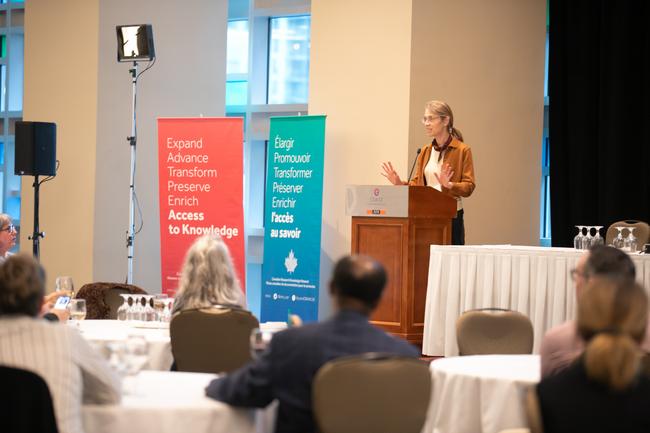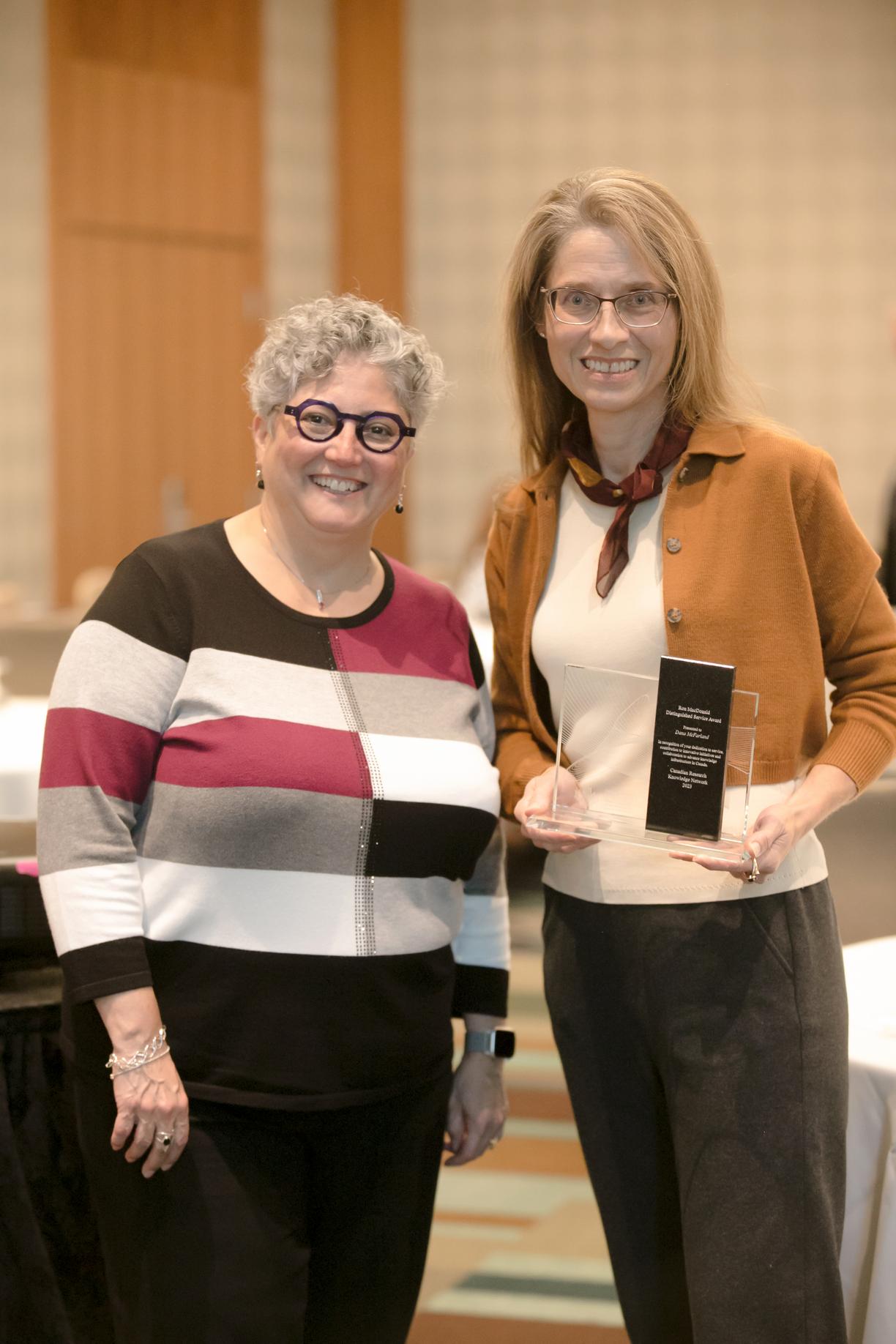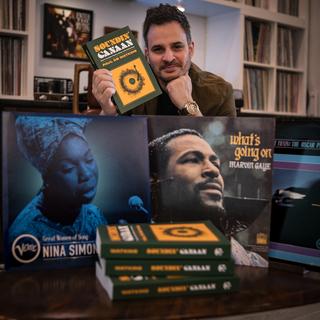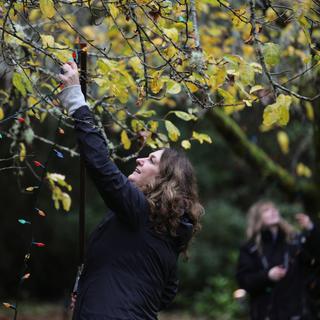Dana McFarland (right), Librarian and Coordinator, eResources and Scholarly Communication, received the Ron MacDonald Distinguished Service Award. Photos supplied by Canadian Research Knowledge Network (CRKN).
Dana McFarland has devoted her career to preserving and making a wide range of information more accessible while ensuring respect for cultural property is maintained. Through her current role as Librarian and Coordinator, eResources and Scholarly Communication at VIU, some of her best days are when she gets to help people “share outcomes of their scholarship, teaching or creative work thoughtfully and openly.”
This Fall, McFarland was awarded the Ron MacDonald Distinguished Service award from the Canadian Research Knowledge Network (CRKN). The group recognized the pivotal role she played on the heritage program and as inaugural chair of the Canadiana Content Sub-Committee, through which she coordinated guidance and recommendations for developing and enhancing Canadiana collections. Her contributions have “ensured a strong path forward for Canadiana as vital research infrastructure with content that showcases the diverse stories of Canada’s past,” states the release.
The news release also mentions that, together with VIU colleagues Patricia Geddes and Jean Blackburn, McFarland created a guide for vendors to support decolonization efforts and advocate for respect of Indigenous cultural property.
“She has been a role model as a non-Indigenous librarian with a sustained commitment to reconciliation and decolonization since before most non-Indigenous colleagues were thinking about these issues,” says Gwen Bird, University Librarian & Dean of Libraries, Simon Fraser University. “And she has the invaluable skill of being able to explain technical issues to all colleagues, including those with less in-depth knowledge of current technology. I’m delighted to see her receive this well-deserved award.”
McFarland started her career as a librarian at UBC after completing her Master of Library and Information Studies there. She went on to work at Royal Roads University and for the Hul’qumi’num Treaty Group before joining VIU in 2009.
University Librarian David Alexander, who wrote the nomination letter for McFarland, says she is deserving of this recognition for her contributions to the knowledge sector and for her overall exemplary service.
“She is a solid library leader, is adept at connecting others in the pursuit of positive transformation in our sector and she always brings innovative ideas to the table and makes them happen,” he adds.
Tell us a bit about yourself.
I have always lived in what is now BC, and in stz’uminus territory near Ladysmith since 1997.
What inspired you to become a librarian?
That story takes a different shape depending on why I’m telling it.
tl;dr? As a young woman making choices about an academic life, libraries offered appealing diversity of work related to learning and scholarship, the potential to work creatively and strategically, and in collegial and collaborative ways. I’m happy to talk with anyone who may be interested in library work.
Can you tell us a bit about your career trajectory?
I returned to school, for a graduate degree in Library and Information Studies, after teaching history on a contract basis in the BC college system for a few years. In those days we didn’t talk about precarity as such, but it was hard to get academic positions then, including in libraries. When I graduated from “library school,” many classmates were making what they could of part-time jobs and contracts, taking jobs in other fields or leaving the country for places where they could find work. With the other disciplinary and teaching experience I had, I was able to stay in BC, landing and building on short-term library work in post-secondary, which windingly led to the first full time regular job of my life, at Royal Roads University, where I was for a time the only librarian in a newly created institution.
I remained at RRU as University Librarian from 1997 to 2006. On a secondment from 2006 to 2007, I worked with the Hul’qumi’num Treaty Group as they developed their physical and digital library. Following the secondment, I returned to RRU as Director of Library and Learning Services, with responsibility for a family of departments, until 2009, when I decided to join the exemplary library team at VIU.

Dana McFarland speaks at the awards ceremony.
What is the one highlight of your time at VIU that you would share first if asked?
It is hard to think of a single highlight.
In my time at VIU, also before, and increasingly, it has been important to encourage and participate in working cultures of collaboration within the organization, and also – critically – beyond it. Libraries achieve much through purposeful collaboration with each other, developing and delivering shared initiatives for the collective benefit of their users. I feel blessed to have worked with colleagues and leaders at VIU who have consistently understood and advocated for the many strategic and practical values of working in this way.
More tangibly, I am sometimes able to work with those who are seeking ways to share outcomes of their scholarship, teaching or creative work, thoughtfully and openly. These kinds of generous actions resonate beyond the university to others in our networks, reaching out to communities, supporting equity of access and evidence-informed practice, building relationships and contributing to the incremental creation of new knowledge. When I can be a resource to this kind of work, it’s a really good day.
What’s next in the future of libraries as we know them in your opinion?
I can be a little impatient when I read pontificating pieces on the future of libraries. That construct is often used to associate libraries with some agenda that is rooted in a nostalgic past, or to position libraries as quaint artefacts with diminishing relevance in the imagined future. Those are simplistic narratives that I’d rather not support.
“A library is a living organism.”*
The future is tomorrow, and the day after. Beyond that, libraries look forward and plan like other organizations, based on what we can foresee in our contexts. And like anyone who plans, we need to have humility about our capacity to do it. To me, this means listening and thinking about relationships and implications, being careful, critical, and responsive in goals and actions, and being grounded in and guided by purpose, values and principles.





